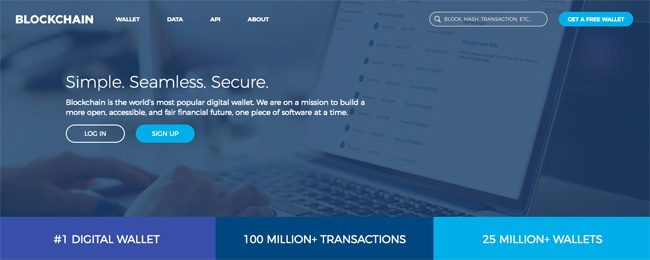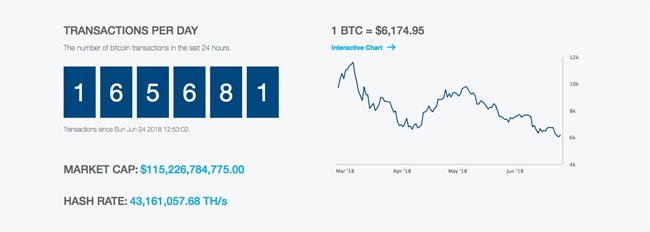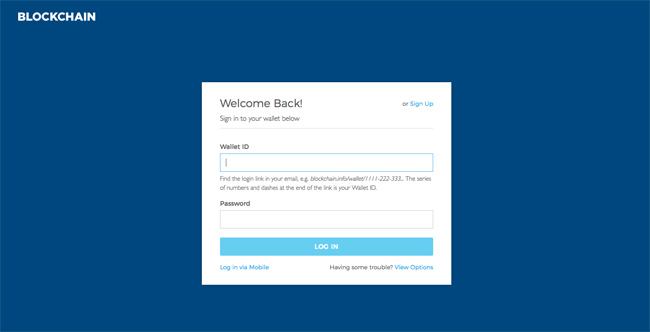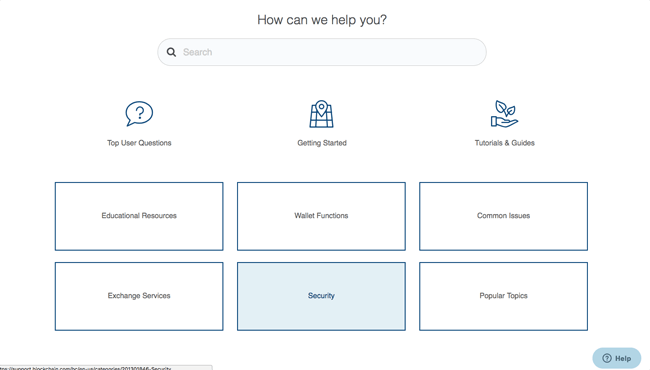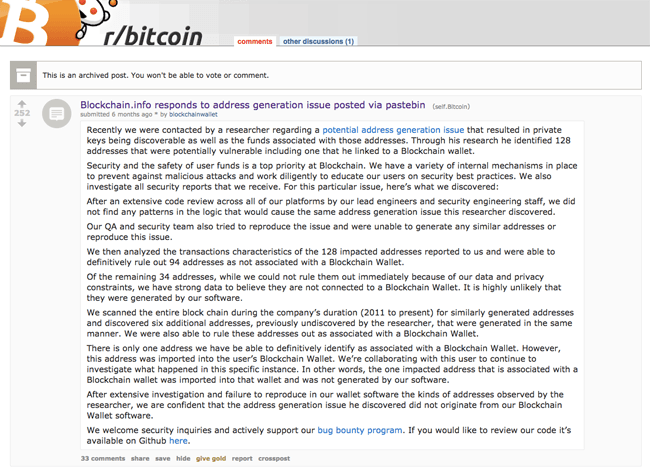If you have been looking around for wallet providers, there are chances that you have already come across the name of Blockchain wallet.
The wallet is not only famous for being named after the sought-after technology but actually holds its own as a revered provider of cryptocurrency wallet solutions in an industry which offers a plethora of them.
The platform has been around since the early days of Bitcoin and currently supports not only this prime cryptocurrency but tops up the list with Ethereum and Bitcoin Cash.
Over the last few years, Blockchain has carved the distinction of having performed more than 100 million transactions for its users, which itself is enough to tell you of the popularity and the reliability that the platform has built for itself.
However, vetting a company that is going to keep your financial assets safe is only a prudent move, which is why we have compiled a detailed guide that will you learn more about the Blockchain wallet, its offerings, services, and overall value proposition for you to determine whether or not to use it as your primary wallet.
So without much dilly-dallying, let’s go ahead and start on this detailed yet interesting class on one of the most popular wallets of the cryptocurrency network.
Blockchain Wallet Review: History
Originally launched as Blockchain.info, Blockchain was founded in August 2011 by Ben Reeves, Peter Smith, and Nicolas Cary. At the time of this writing, Smith, and Cary are serving as the company’s CEO and vice chairman, respectively, with the company being headquartered in Luxembourg.
The platform was founded by these three individuals with the idea of providing cryptocurrency users with a secure and effective way to safeguard their digital assets in an environment where such solutions were scarce at the time.
Starting as a blockchain explorer, it took some time for Blockchain for people to start trusting it in the new and growing space.
However, it gradually yet certainly gathered enough trust by users to start getting recommended to their peers, and with word of mouth as well as social media outreach, it slowly went on to start gaining enough traction to be considered a viable platform and released its first Android and iOS apps in 2012.
Due to the promise that it showed during its phase of growth, Blockchain was also able to acquire numerous investments from popular organizations and serial investors such as Virgin Group and Richard Branson; GV; Digital Currency Group; and Roger Ver.
The investments also included a highly publicized funding round from October 2014, where Blockchain obtained over $30 million from Lightspeed Venture Partners and Mosaic Ventures, which was also touted as the largest funding round in the cryptocurrency industry for its time.
The Blockchain wallet has now gotten to such a point of success where it is now synonymous with cryptocurrency wallet solutions, which is not only due to its nifty name but the efficacy of the solutions that it provides to its users.
The company’s user base has grown from just a few thousand wallets to over 25 million wallets, a number which continues to grow with each passing day. On an average basis, it performs over 160,000 transactions for its users each day.
With a team that has experience in working in organizations such as Google, Apple, Goldman Sachs, Barclays, NASA, and PwC among others with an outreach that expands over 140 countries, the Blockchain wallet has grown to be a powerhouse solution with a reputation that is hard to come by.
Of course, it did not just reach that revered level of success by only talking about solutions, but by providing them to its end users and proving its mettle to them through its web services and mobile wallets.
And that leads us to talk about the wallet’s provided functionalities and services.
Blockchain Wallet Review: What Does The Blockchain Wallet Do?
Blockchain wallet provides storage options to its users for Bitcoin, Bitcoin Cash, and Ethereum, and it does so while maintaining some of the highest security standards that the cryptocurrency industry has to offer.
While it had already been built upon the idea of providing the utmost security to its users, the platform took it one step further in February 2016 when it decided to upgrade its services to be a hierarchical deterministic (HD) wallet, which brought it along the lines of some of the most secure wallets available within the industry.
Since the blockchains of Bitcoin, Ethereum and Bitcoin Cash post the transaction information such as sending and receiving addresses as well as the transacted amount on their public ledgers, malicious parties looking to track high valued wallets can cross-verify a few patterns and go after wallets which they think are of the highest value. Furthermore, it also makes users susceptible to being tracked by other entities that are looking to identify their transactions on these networks.
Furthermore, when it comes to generating mnemonic/seed for wallets, users have to make sure that the algorithm being used for the generation remains unpredictable at all costs, because if this aspect of wallet security sees a breach, then it could compromise the safety of their funds.
Through the HD framework, Blockchain offers users the ability to generate new addresses each time that they have to receive a transaction and generate completely unpredictable mnemonic/seed for their wallet access as well. As a result, these solutions resolve the aforementioned problems and provide users with additional security and privacy.
Building upon the HD approach, Blockchain wallet uses specific implementations to generate the accounts, addresses and the mnemonic/seed for its wallets. It uses BIP44 for generating accounts and addresses; whereas, it implements BIP39 to generate mnemonic/seeds for the users of its wallets.
Through these functionalities coupled with other security standards such as two-factor authorization (2FA), Blockchain wallet establishes itself as a technological marvel for cryptocurrency storage.
Through the provided apps, users of Blockchain wallet can store and access their cryptocurrencies at any time they want while having the peace of mind that their assets remain secure. The wallet provides a visually pleasing interface that is also easy to navigate, and through it, users can send cryptocurrencies to other wallets without having to jump through hoops.
But that is not where Blockchain wallet’s functionalities end since besides being a secure cryptocurrency wallet, it doubles as an exchange platform for its users as well.
The platform provides citizens of Europe, those living in these countries, to buy and sell Bitcoin directly through the wallet app, where the services are powered by its partner cryptocurrency exchange Coinify. The supported countries are also provided for your reference below.
Supported European Countries
Åland Islands
Austria
Azores
Belgium
Bulgaria
Canary Islands
Croatia
Cyprus
Czech Republic
Denmark
Estonia
Finland
France
French Guiana
Germany
Gibraltar
Greece
Guadeloupe
Guernsey
Hungary
Iceland
Ireland
Isle of Man
Italy
Jersey
Latvia
Liechtenstein
Lithuania
Luxembourg
Madeira
Mayotte
Malta
Martinique
Monaco
Netherlands
Norway
Poland
Portugal
Réunion
Romania
Saint Barthélemy
Saint Martin
Saint Pierre and Miquelon
San Marino
Slovakia
Slovenia
Spain
Sweden
Switzerland
United Kingdom
In addition to the above, in September 2017, Blockchain wallet announced that it had partnered with Indian exchange Unocoin to start providing Bitcoin buying and selling services directly through its app.
In a similar move in January 2018, Blockchain wallet also started providing the same services to the citizens of select U.S. States, with the partner in this region being SFOX. At the time of writing, the services can be availed by citizens of 21 States.
However, before users can start buying and selling Bitcoin on its platform, Blockchain wallet requires its users to follow certain verification protocols, the requirements of which depend upon the region in which they are residing. In addition to these requirements, certain exchange fees also apply to each transaction, which is determined at the time the transaction is being performed.
However, the process for verification and posting trades is easy, since Blockchain wallet’s interface once again makes the procedure seamless to initiate and follow right until its execution.
Furthermore, the Blockchain wallet also allows its users to exchange between its offered cryptocurrencies at any time. This means that users can exchange between Bitcoin, Ethereum and Bitcoin Cash right from the app.
All that they have to do is select the relevant option, enter the amount of the cryptocurrency that they want to exchange, and they can move forward with receiving their new cryptocurrency in their wallet as a result of the trade.
In addition to the aforementioned features, Blockchain also allows users to utilize popular anonymizing service Tor with its apps, which adds yet another layer of privacy and security to the overall functionalities of the Blockchain wallet.
To top things off, the platform also maintains its famed block explorer where users can see blockchain transactions through the platform’s clean interface.
Blockchain Wallet Review: How to Setup The Blockchain Wallet?
Setting up the Blockchain wallet is easy and free. Users can download the app or visit the website, and select the option to create their free wallet.
There is no fee for using Blockchain wallet, but users do need to pay the exchange fee when making trades on the platform.
As with any other wallet service, users also have to be wary of the transaction fee that is levied by the respective blockchain whenever a user is sending their cryptocurrency to another address.
Upon signing up, users are assigned a unique Wallet ID. However, this Wallet ID only remains their identifier on the Blockchain platform, much like a user ID on any other website. Therefore, users need to utilize specific sending and receiving addresses in order to perform transactions through the wallet.
However, those steps remain easy as well and all that they take are a few taps and clicks on the screen.
The wallet also provides a step-by-step guide that leads users through the process for making their wallet more secure and the tutorial-like procedure can lead even the most novice of cryptocurrency wallet users efficiently towards making their purchase more secure.
With these features, Blockchain wallet can be easily considered as having one of the most helpful interfaces when it comes to completing the setup process for a cryptocurrency wallet.
Additional Services by Blockchain Wallet
Apart from providing wallet and exchange services through its interface, Blockchain is also known for focusing on research and development of new technologies, where it has provided some helpful tools to the development community as well.
The Blockchain wallet platform has separate APIs available on it, through which it encourages developers to create their own solutions. These APIs include payment processing solutions, wallet services, and transaction and blocks data information.
In May 2016, Blockchain wallet also launched the iteration of its “Thunder” implementation, which is supposed to be a supplementary iteration of the Lightning Network.
Blockchain made the Alpha available on Github and encourages its users to make use of the still-in-development Thunder to see if they can start creating Lightning apps to support the Bitcoin network and resolve the scalability and high transaction times and fee issues that the network faces during times of increased demand.
The Blockchain wallet also provides enterprise solutions for businesses that are looking to tap into the world of blockchain and distributed ledger technology (DLT) and aims to leverage its R&D division to help increase the overall blockchain ecosystem.
These additional services might not be for the everyday user of a cryptocurrency wallet, but they do add to the overall profile of Blockchain as a technology company and further establish its credibility within the sector.
Blockchain Wallet Review: Customer Support
From a development perspective, Blockchain wallet has a team of dedicated individuals who keep making updates and adding new solutions to the platform’s set of offerings, something that they started doing right from the initial years of Blockchain.info and which they have continued to this date.
As far as the blockchain service support goes, there have been a few complaints from users who claimed that their cryptocurrency had been stolen or transferred to other addresses without their consent or knowledge.
While other instances have remained isolated, perhaps the most publicized issue remains to a Reddit user by the handle of @fitwear.
To summarize, the user claimed that they had lost 9 BTC to an unknown address without it ever being in their knowledge. The wallet belonged to Blockchain, and the issue caused a controversy which caused various online publications to cover the story.
The fiasco culminated when the receiver of the funds, who remained just as baffled as @fitwear about receiving the Bitcoins, came forward and transferred the Bitcoins back to the original holder.
However, Blockchain denied claims that the issue had been caused by any vulnerability in its algorithm and maintained that the deduction was made after rigorous research and investigation.
However, despite this reported issue and a few other isolated instances, users who continue utilizing Blockchain as their primary wallet swear by its services and by the looks of it, do not plan to let go of it.
Apart from these issues, Blockchain wallet and its team seem to be looking into inquiries in adequate time and reply to users in a few hours at most. An inquiry can be posted through the app or through the website.
Should Blockchain Wallet Be Selected as a Primary Wallet?
Blockchain wallet is a marvel of security and functionality, so it can certainly be used by those who utilize limited cryptocurrencies namely Bitcoin, Ethereum and Bitcoin Cash during their day to day operations and would like to keep them secure through a reliable provider.
However, the limitation in the number of cryptocurrencies itself makes those users wanting more out of Blockchain who keep other popular cryptocurrencies in their custody and do not want to jump from wallet to wallet in order to access all their assets in a timely manner.
Furthermore, since Blockchain wallet remains a hot wallet, the possibility of unforeseen instances happening, however minimal, remains on the horizon and thus a high value of funds should be kept in a hardware wallet instead.
That being said, Blockchain provides all the features that one can expect out of a safe and secure wallet, and with its provision of mobile accessibility and additional services without ever compromising on the safety feature, it remains as a viable option for users who do not want to deal in more cryptocurrencies than what Blockchain can support at the moment.
